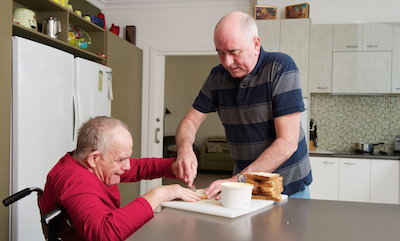For LGBT Caregivers, Dual Stresses May Contribute to Worse Health, with Exceptions.
 LGBT people are more likely to experience physical and mental health issues. So are informal caregivers—people who provide unpaid help to someone with cognitive, physical, or psychological impairments to do the activities of daily living.
LGBT people are more likely to experience physical and mental health issues. So are informal caregivers—people who provide unpaid help to someone with cognitive, physical, or psychological impairments to do the activities of daily living.
Now, a new study led by School of Public Health researchers finds the combined stresses experienced by LGBT caregivers lead to worse physical and mental health, with some exceptions. Published in The Gerontologist, it is the first representative study of caregiving among members of the LGBT community compared with their heterosexual and cisgender counterparts.
“As the population ages, the number of individuals who are caregivers is expected to increase, and understanding the health effects of caregiving and caregivers’ needs is important,” says lead author Ulrike Boehmer, associate professor of community health sciences. “LGBT caregivers are rarely acknowledged as caregivers, despite their providing care in great numbers.”
The researchers used 2015 and 2016 data from the Center for Disease Control and Prevention’s annual Behavioral Risk Factor Surveillance System (BRFSS) telephone survey. They focused on respondents in the 19 states where the BRFSS asks about caregiving, sexual orientation, and whether the respondent is transgender or cisgender. This resulted in a sample of 113,052 individuals, of whom 112,545 were cisgender and 507 were transgender—including transgender men, transgender women, and nonbinary individuals.
The researchers found that 1 in 4 gay/bisexual cisgender men were caregivers, compared to only 1 in 6 cisgender heterosexual men, while about 1 in 5 cisgender women were caregivers regardless of sexual orientation. They also found about 1 in 4 or 5 of all respondents were caregivers regardless of whether they were cisgender or transgender.
The researchers then compared the mental and physical health of the respondents using BRFSS data on self-reported health and the number of poor physical or mental health days in the past 30 days.
Among cisgender respondents, being LGB and being a caretaker were both consistently associated with worse health, with one exception. Among men, heterosexual caregivers and gay/bisexual noncaregivers reported significantly worse physical health than heterosexual noncaregivers, but gay/bisexual caregivers did not. However, with respect to mental health, male and female LGB caregivers reported the worst mental health, followed by LGB noncaregivers, then heterosexual caregivers. LGB women caregivers had the worst physical and mental health of any group.
The researchers also found that transgender caregivers and noncaregivers both had similar health to cisgender noncaregivers, except for having higher odds of having had 14 or more poor mental health days in the last month. This finding contradicts previous research showing transgender individuals generally have worse physical and mental health than their cisgender counterparts, the authors wrote, and may be due to the small sample of transgender respondents and/or the possibility that the BRFSS identified a particularly advantaged segment of the transgender population. Still, the authors wrote, this was the first study to look at the health of transgender caregivers: “We identified transgender caregivers as a young and remarkably healthy subpopulation among transgender individuals, which was previously unknown, but requires confirmation through additional studies.”
“Integrating measures of sexual orientation and gender identity in public health surveillance data allows us to identify differences and needs of sexual and gender minorities,” Boehmer says. “But this study also revealed shared experiences, in that 70 percent of caregivers care for a relative or child, irrespective of caregivers’ sexual or gender identity.”
The study was co-authored by Emily Lord (SPH’17), who was a student during the study, and Lisa Fredman, professor of epidemiology. Melissa Clark of the University of Massachusetts Medical School was also a co-author.